Often referred to as the “Swiss army knife of cloud storage,” Rclone is an open-source, command-line file transfer and sync tool. You can use it to transfer and sync files within and across sites (on-premises, cloud, and hybrid cloud environments). It also works as a storage gateway to access files, enabling you to mount any local, cloud, or virtual file system as a disk on your devices.
Rclone has great features that put it ahead of other open-source replication solutions, such as multithreaded transfers and support for 70+ cloud storage products.
However, Rclone suffers from shortcomings that cause some users to look for an Rclone alternative.
For example:
- It’s built on a hub-and-spoke replication architecture that inherently limits replication speed, reliability, and scalability.
- It can only perform one-way and two-way syncs.
- It uses an FTP transfer protocol that’s poorly suited for transfers over the WAN.
So if your organization has a data-intensive workflow that requires speedy replication of files across many locations, you’ll need a better solution that can quickly and reliably sync large payloads over long distances and in multiple directions.
In this article, we’ll compare Rclone to eight alternatives — six file sync and transfer alternatives and two storage gateway alternatives.
The first of these options — Resilio — is the fastest, most flexible, and most scalable.
Resilio Active Everywhere (formerly Resilio Connect) is a real-time file synchronization software system that’s designed to reliably sync enterprise data in any direction and over any network (with no limits on the size or number of files). It’s also the only solution on this list that provides both file replication and a storage gateway to any file, block, or object storage.
To see Resilio in action for yourself, book a demo.
Resilio is the best solution for syncing files across cloud and hybrid cloud infrastructures because it:
- Can perform real-time data synchronization within and across any type of file, block, or object storage.
- Supports just about any type of S3-compatible cloud storage provider, such as AWS S3, GCP, Azure Blobs, Backblaze, Wasabi, WekaIO, MinIO, and more.
- Works across platforms, enabling you to easily install it on your existing infrastructure and use just about any operating system (Windows, Linux, MacOS, FreeBSD, Open BSD, and more) and any device (servers, desktops, laptops, mobile devices, IoT devices, virtual machines, and more).
- Can be managed with a user-friendly graphic user interface that you can access from any web browser, though you can also use command-line if preferred.
- Syncs in any direction, such as one-way, two-way, one-to-many, many-to-one, and N-way.
- Uses a P2P replication architecture that enables it to achieve blazing-fast sync speeds, scale organically, and eliminate single points of failure.
- Optimizes transfers over any network (VSAT, cell, Wi-Fi, any IP) using a proprietary WAN acceleration protocol.
- Provides a file gateway that enables you to efficiently access files stored across your entire cloud, on-premises, or hybrid storage from anywhere.
Organizations such as Turner Sports, Skywalker Sound, Deutsche Aircraft, Delirio Films, and more use Resilio Platform to achieve blazing-fast, scalable replication. To see how Resilio Platform can quickly sync large data in Azure (or any other cloud), schedule a demo.
1. Resilio Active Everywhere: The Best Rclone Alternative for Speed, Reliability, Flexibility & Scalability

Resilio is a real-time file synchronization software system that uses a P2P replication architecture and a UDP-based WAN acceleration protocol to provide fast, reliable transfers over any network. Resilio is also the only file replication solution on this list that, like Rclone, provides a storage gateway to any file, block, or object storage on-prem or in the cloud.
Organizations rely on Resilio for a wide range of use cases, such as remote collaboration, server synchronization (on-prem, cloud, and hybrid), disaster recovery, edge data synchronization, software update distribution, and more.
Resilio delivers high-performance file sync and access thanks to its:
- Blazing fast, organically scalable, multidirectional P2P sync.
- UDP-based WAN-optimized transfers.
- Efficient object storage gateway that enhances productivity and minimizes data egress costs.
- Easy integration into any IT infrastructure and workflow.
- Centralized management and granular control over your entire environment.
- State-of-the-art security features.
Blazing Fast, Organically Scalable P2P Sync
Like most file transfer and sync solutions, Rclone relies on a hub-and-spoke replication architecture.
Hub-and-spoke replication consists of a hub server and several remote servers. All file transfers must first go through the hub server. If a remote server wants to sync files with the other remote servers, it can’t transfer the data directly to the other remote servers. Instead, it must first sync with the hub server, which then replicates the files to each remote server one by one.
Rclone’s hub-and-spoke replication architecture inherently limits its:
- Speed: The need to first sync with a hub server adds an extra step that unnecessarily delays replication. Replication can only occur between two servers at a time.
- Reliability: Hub-and-spoke replication introduces single points of failure. Replication speed is limited to the slowest endpoint in your environment — i.e., if one endpoint is on a slow network (or goes down), it can delay sync for every other endpoint. And if the hub server goes down, replication fails entirely.
- Scalability: Since replication can only occur between two servers at a time, scalability is poor — i.e., syncing large data (large files or large numbers of files) across a large number of endpoints takes a long time. Adding more endpoints to your environment increases synchronization time and creates more single points of failure.
Rclone overcomes some of these speed issues by providing the ability to perform multithreaded syncs. However, it still falls short of the blazing fast speed, bulletproof reliability, and organic scalability that Resilio’s P2P replication provides.
Blazing Fast Sync Speeds
Resilio is an agent-based solution that uses a peer-to-peer (P2P) replication architecture (though it can be deployed in a hub-and-spoke configuration, if desired). With P2P replication, every endpoint with a Resilio agent can share data directly with any other Resilio agent. All agents transfer files concurrently so they can work together to quickly sync your environment.
For example, imagine you want to sync a file across five endpoints. Resilio uses a process known as file chunking to split that file into five chunks that can transfer independently of each other.
Endpoint 1 can share the first file chunk with Endpoint 2. Endpoint 2 can immediately share that file chunk with any other endpoint, even while it waits to receive the rest of the file. Peers collectively work together, enabling you to sync your environment 3–10x faster than most hub-and-spoke solutions.
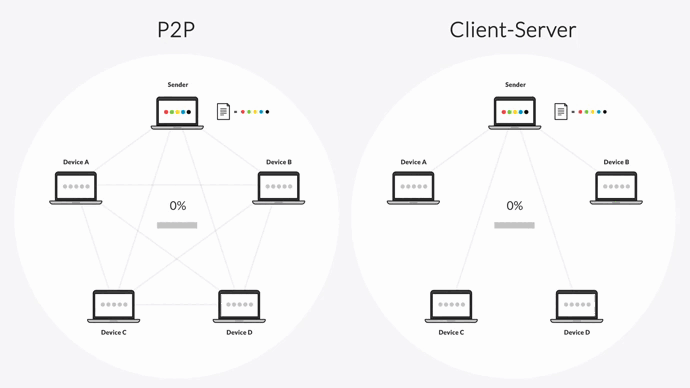
Resilio also enhances sync speed by:
- Real-time replication: By using optimized checksum calculations (i.e., identification markers assigned to each file that change when the file changes) and notification events from the host OS, Resilio can immediately detect and replicate file changes.
- Replicating only file deltas: Resilio only replicates the changed portions of files.
- Deduplication: Resilio uses deduplication to eliminate duplicate file data.
It can also sync data in real-time. By using optimized checksum calculations (i.e., identification markers assigned to each file that change when the file changes) and notification events from the host OS, Resilio can immediately detect and replicate file changes.
Multidirectional Sync
Another Rclone limitation is that it can only sync in two directions: one-way and bidirectional.
But Resilio’s P2P architecture allows it to sync data in any direction, such as:
- One-way: Create one-way syncs to use Resilio as a file transfer and backup tool — for example, migrating to the cloud, online backup, or transferring cloud files across cloud regions.
- Bidirectional: Keep two endpoints synchronized to support multi-site collaboration.
- One-to-many: Use Resilio to distribute files from one server to many endpoints, such as for software update distribution or distributing updates to a fleet of vehicles in the field.
- Many-to-one: Consolidate data from many servers onto one for multi-site backups or collecting data from a fleet of vehicles in the field.
- N-way: Keep multiple (even thousands) geographically distributed endpoints synchronized simultaneously for remote and hybrid collaboration scenarios, cloud server synchronization, and more.
Resilio’s ability to provide N-way sync is one of the primary capabilities that enables it to enhance fast-paced, data-intensive workflows better than Rclone and other file replication and sync solutions.
N-way sync eliminates workflow bottlenecks in remote and distributed collaboration scenarios. Employees at any location can make changes to files and have those changes immediately sync in multiple directions to every other location — so everyone on your team always has the most current versions of files.
For example, Wargaming uses Resilio to speed up video game build releases by quickly syncing 50+ GB game builds between 20 offices.
For disaster recovery scenarios, Resilio’s ability to replicate in real-time enables you to achieve sub-five-second RPOs (Recovery Point Objectives). You can sync data across your entire environment (effectively turning every endpoint into a backup site) and achieve Active-Active High Availability with failover configured between any endpoints.
When a disaster (or planned outage) occurs, every endpoint can work concurrently to bring your system back online — enabling you to achieve RTOs (Recovery Time Objectives) within minutes of an outage.
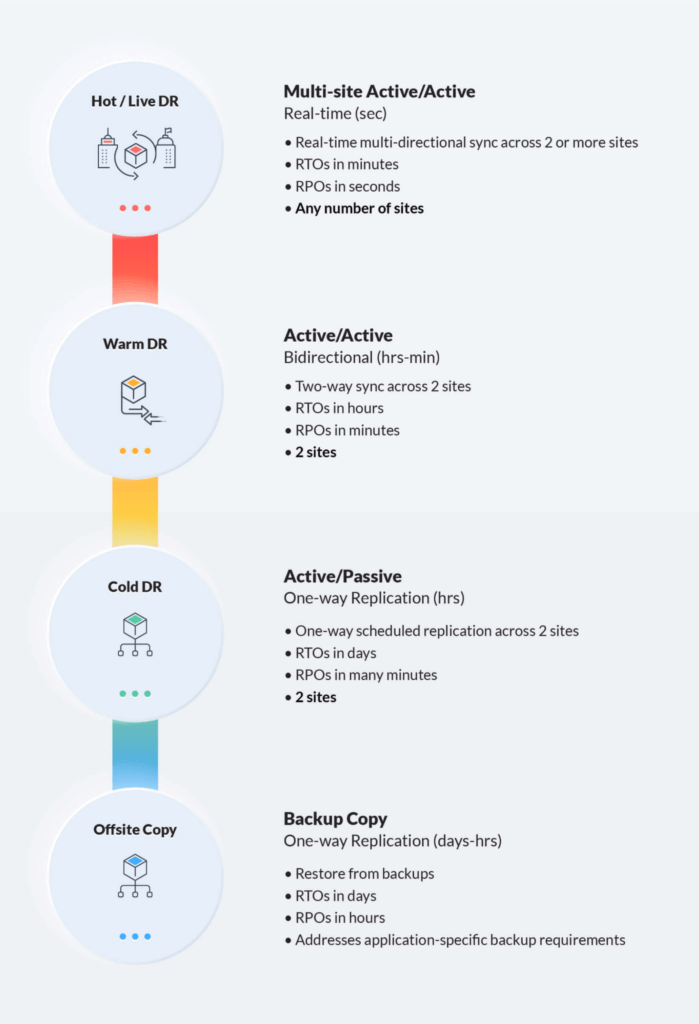
Organic Scalability
As stated earlier, Rclone is a hub-and-spoke solution that scales poorly. As your data grows (i.e., file sizes and number of files) and you add more endpoints, the longer it will take to sync your environment.
However, Resilio’s P2P replication architecture makes it organically scalable. Since every endpoint can take part in replication simultaneously, adding more endpoints inherently increases the sync speed and resources (i.e., CPU, bandwidth, etc.), allowing Resilio to sync:
- Files of any size: In tests, Resilio’s engineers successfully transferred a 1 TB payload across Azure regions in 90 seconds.
- Files of any number: In tests, Resilio engineers successfully synchronized 450+ million files in a single job.
- Deliver files in fixed timeframes: Resilio can synchronize many endpoints in roughly the same time it takes to sync two. Multiple peers work together to sync in parallel.
Resilio also provides another capability for dramatically increasing sync speed known as horizontal scale-out replication. It allows you to cluster Resilio agents together in order to pool their resources and increase transfer speeds linearly. Our engineers were able to cluster 10 agents and reach speeds of 100+ Gbps, though you can cluster even more agents to achieve even greater speeds.

Bulletproof Reliability
Resilio’s P2P architecture eliminates single points of failure. If any endpoint in your environment goes down, the necessary files or services can be provided by any other available endpoint.
Resilio also provides other features that enhance the reliability of transfers, such as:
- Automatic retries: Resilio automatically retries failed transfers until they’re complete.
- Checksum restarts: Like Rclone, Resilio resumes failed transfers at the point of interruption rather than retransmitting redundant data (which can congest networks).
- Offline access: Resilio enables you to access and transfer data over the LAN when internet connections go down (as described in the marine construction case study above). When the internet connection is restored, Resilio can automatically sync your data across your environment.
- Dynamic rerouting: If any endpoint or network goes down, Resilio can dynamically reroute around the outage to ensure your data always reaches its destination.
Optimized Transfers Over Any Network with WAN Acceleration
Rclone optimizes transfers over WANs and unreliable, intermittent connections via:
- Reducing the size of the data being transferred with compression and deduplication.
- Restarting failed transfers with checksum restarts (i.e., restarting interrupted transfers at the point of interruption).
While these methods help, they don’t sufficiently maximize bandwidth utilization or account for fluctuating conditions on these networks.
Moreover, Resilio provides those same features while also optimizing transfers with a UDP-based WAN acceleration protocol known as Zero Gravity Transport™ (ZGT).
ZGT intelligently analyzes the underlying conditions of a network (i.e., latency, packet loss, and throughput over time) and adjusts to these conditions dynamically in order to maximize bandwidth utilization and transfer quickly and efficiently.
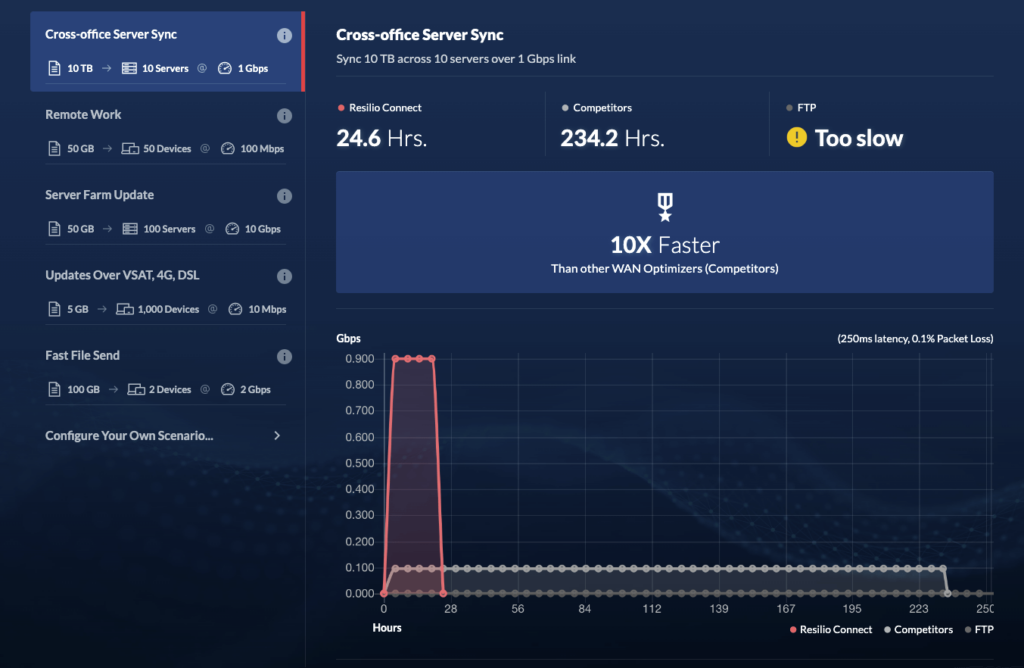
ZGT accomplishes this through:
- Congestion control: ZGT uses a congestion control algorithm that constantly probes the Round Trip Time (RTT) in order to identify and maintain an ideal data packet send rate.
- Intermittent acknowledgments: Rather than acknowledging each packet receipt, ZGT sends acknowledgments for groups of packets that contain additional information about packet loss.
- Delayed retransmission: ZGT retransmits lost packets once per RTT to reduce unnecessary retransmissions.
Because of ZGT, Resilio allows you to transfer data over any type of connection, such as VSATs, cell (3G, 4G, 5G), Wi-Fi, and any IP connection.
It seamlessly adjusts to low-capacity links at the network’s edge with optional data compression for metered connections, enabling it to provide reliable, predictable transfers for:
- Organizations that operate at the edge and far edge (such as at sea or in communities with underdeveloped network infrastructure).
- Workflows that involve endpoints in remote locations with little connectivity (such as filming and projects in remote locations).
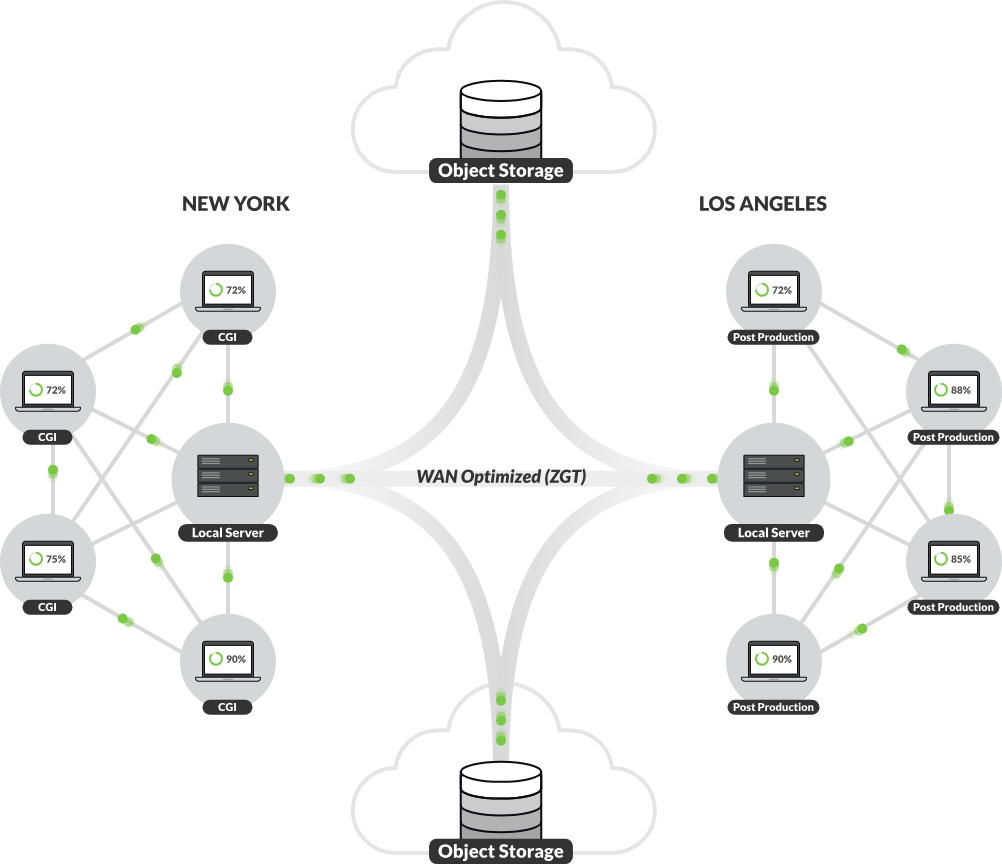
A marine construction company uses Resilio to reliably deliver updates to their fleet of ships. Resilio’s WAN-optimized protocol enables them to overcome limited, intermittent connections at sea and transfer updates to each ship’s central server. Once delivered, Resilio automatically delivers the updates to each workstation (20–40 total) onboard the ship over the LAN. Their team can manage and monitor the entire process remotely from their HQ on land.
Efficient File Access via File Storage Gateway
You can use Rclone as a storage gateway by mounting any local, cloud, or virtual file system as a disk on your devices. Rclone provides access to files over SFTP, HTTP, WebDAV, FTP, and DLNA protocols.
While this is a capability that many other open-source solutions (such as Rsync) don’t offer, it still has a few shortcomings, such as:
- You need to operate this process using Rclone command-line syntax.
- It doesn’t include any extra features that help you control the costs of transferring and accessing data in the cloud (such as AWS egress costs).
Resilio provides a file storage gateway that enables you to efficiently access files stored across your entire cloud, on-premises, or hybrid storage (i.e., any file, block, or object storage) from anywhere.
Unlike Rclone, the entire process can be set up and managed through Resilio’s user-friendly GUI (more on this later). Access is provided over SMB (Server Message Block) and NFS (Network File System) protocols.
Resilio’s file gateway includes several features and capabilities that enable you to enhance efficiency, increase productivity, and reduce costs.
Flexible Synchronization
Resilio includes a feature known as Transparent Selective Sync (TSS), which provides the ability to selectively download, store, and sync files (learn more about TSS here).
With TSS, you gain full control over how files are synchronized across your environment. You can control which specific files and folders are synced to which specific endpoints. This enables you to automate file syncs so employees can focus on their tasks and ensure that files are only synced to those who need them — a capability that’s useful for remote work scenarios that require a great deal of control over file access and workflows.
Selective Caching
Most file gateways only cache frequently accessed files on your devices. With Resilio, you can cache frequently accessed files as well as any files you choose.
You can automate file caching by creating policies that automatically cache files and remove them if the file hasn’t been accessed after a certain number of days. Or you can automatically cache any mission-critical files you want.
This enables you to provide employees with faster access to the files they need (and continued access when networks are down), reduce data egress costs, and increase data storage space (by caching frequently used files while storing infrequently used files in long-term cloud storage).
Policy-Based Automation
You can create policies that govern how files are synchronized, cached, downloaded, and purged in your environment.
For example, you can create:
- Cache purging policies that automatically purge files if they haven’t been accessed after a certain time period.
- File retention policies that automatically cache files once they’re downloaded.
- Sync policies that control when and how syncs occur (in real-time or on a fixed schedule).
With policy-based automation, you can create policies that enhance productivity (by automating these processes so employees can focus on their tasks) and reduce costs (by configuring sync, cache, and download policies that minimize data egress).
Full and Partial Downloading
Resilio’s file gateway enables employees to selectively download files from the cloud to their devices. However, employees can also perform partial downloads of just the portions of files and folders that they need. Through partial downloading, employees can get faster access to the files they need while minimizing data egress costs.
3rd-Party Collaboration
While Resilio doesn’t provide intercompany transfers, you can still use it to collaborate with 3rd-parties (such as contractors, remote workers, and other companies) using a shared server and Resilio’s Proxy Server capabilities.
For example, Larian Studios uses Resilio to speed game development by syncing 5x faster between locations as well as to share files with outsourcing partners on an FTP server. Both parties can send files to the FTP server, and Resilio automatically syncs the server with Larian’s offices.

If you create a similar collaboration environment, you can use Resilio’s Proxy Server capabilities to maintain security by:
- Limiting file access: You can limit which files any Resilio agent is allowed to access on your devices. This can be done when working with outside parties or remote workers (remote workers can do the same if they’re working from a home computer and want to keep their personal files private).
- Blocking scripts: You can control programmatic access to specific systems and devices by limiting which agents are allowed to run scripts on your devices. For example, the marine construction company we mentioned earlier sends updates to each ship’s central server and employs scripts to have those updates automatically distributed to each workstation on their ships. They can use the Proxy Server to ensure that only one device from their HQ is allowed to execute scripts on each ship’s server to prevent anyone else from gaining access to their systems.
- Isolating traffic: Resilio’s Proxy Server supports advanced firewall configurations. You can configure outbound connections and use a single IP address behind a corporate firewall.
Unified, User-Friendly Interface
Every employee in your organization can browse and access files from the same user-friendly interface. Resilio’s file gateway interface operates much like Microsoft OneDrive, so most end-users will be familiar with it. And everyone in your organization maintains the same view of files.
Easy Integration and Centralized Management
Rclone is a fairly flexible solution that you can install on Windows, macOS, Linux, and FreeBSD systems. Rclone supports over 70 cloud providers (such as Google Drive, Dropbox, Cyberduck, and more) and includes several backends to adapt or modify different storage providers. But it’s still a command-line solution that requires you to use code to manage and troubleshoot Rclone syncs.
Resilio is designed to be an incredibly flexible solution that’s much easier to manage than Rclone or any other open-source command-line tool.
Easy Integration into Your Infrastructure and Workflow
Resilio is an easy solution to deploy. It works by installing Resilio agents on each endpoint you want to replicate to out from. Then you can create, manage, and monitor replication jobs from your Management Console.
Resilio is a cross-platform solution that you can install on just about any:
- Device: You can install Resilio agents on file servers, desktops, laptops, NAS/DAS/SAN devices, mobile devices (Resilio offers apps for iOS and Android), IoT devices, and virtualization platforms (such as Citrix, VMware, and Microsoft Hyper-V).
- Cloud storage service: Resilio works with just about any S3-compatible cloud object storage, such as Amazon S3, Azure Blobs, Google Cloud Platform, Wasabi, Backblaze B2, Ceph, MinIO, Weka IO, Oracle, Seagate Lyve Cloud, SharePoint, and more.
- Operating system: Resilio supports just about any operating system, such as Windows, macOS, Linux, Unix, Ubuntu, FreeBSD, OpenBSD, and more.
- Workflow solution: You can use Resilio’s REST API to integrate it with popular solutions your team is already using in your workflow, such as development tools (e.g., TeamCity, Jenkins), management tools (e.g., Microsoft SCOM, Splunk), and more.
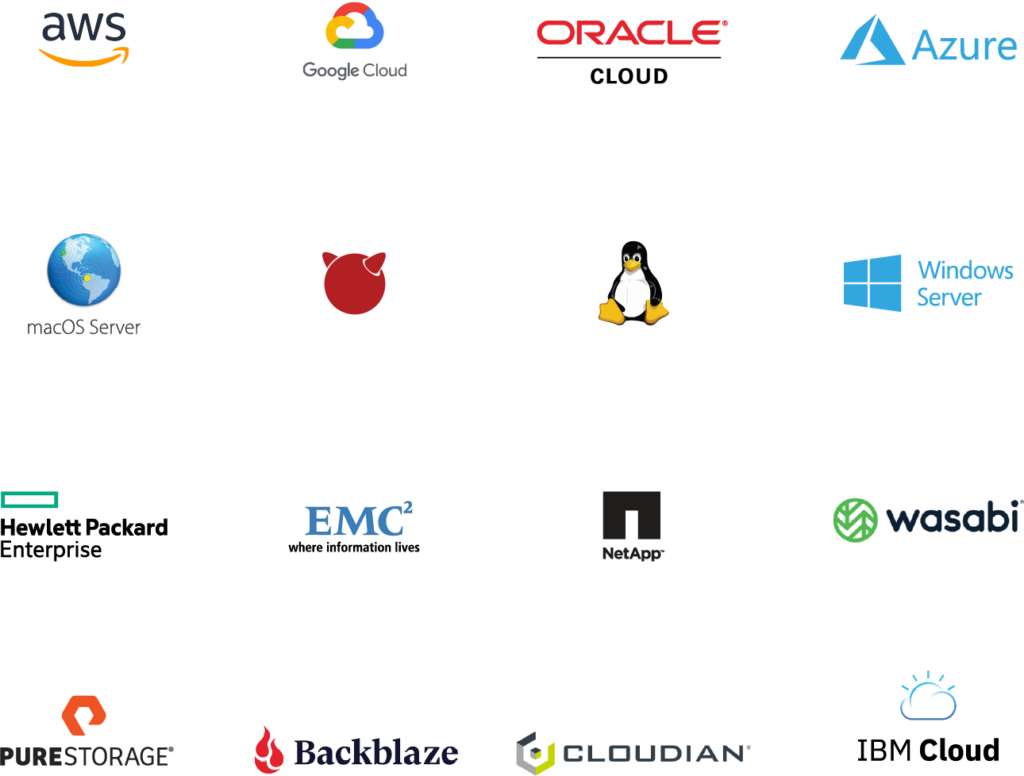
Resilio’s flexibility means that you can easily integrate it into your current IT infrastructure and workflow with minimal operational interruption.
Centralized Management and Automation
While you can manage Resilio via the command-line interface and through scripting, you can also use Resilio’s Management Console: a user-friendly GUI that can be accessed from any web browser. Resilio also provides a complete API set that provides the same functionality as the GUI.
From the API or using the Management Console, you can:
- Create, manage, and monitor replication jobs.
- Create sync, file caching, and network policies from one location.
- Adjust and manage bandwidth at each endpoint and create profiles that govern how much bandwidth is allotted to each endpoint at certain times of the day and on certain days of the week.
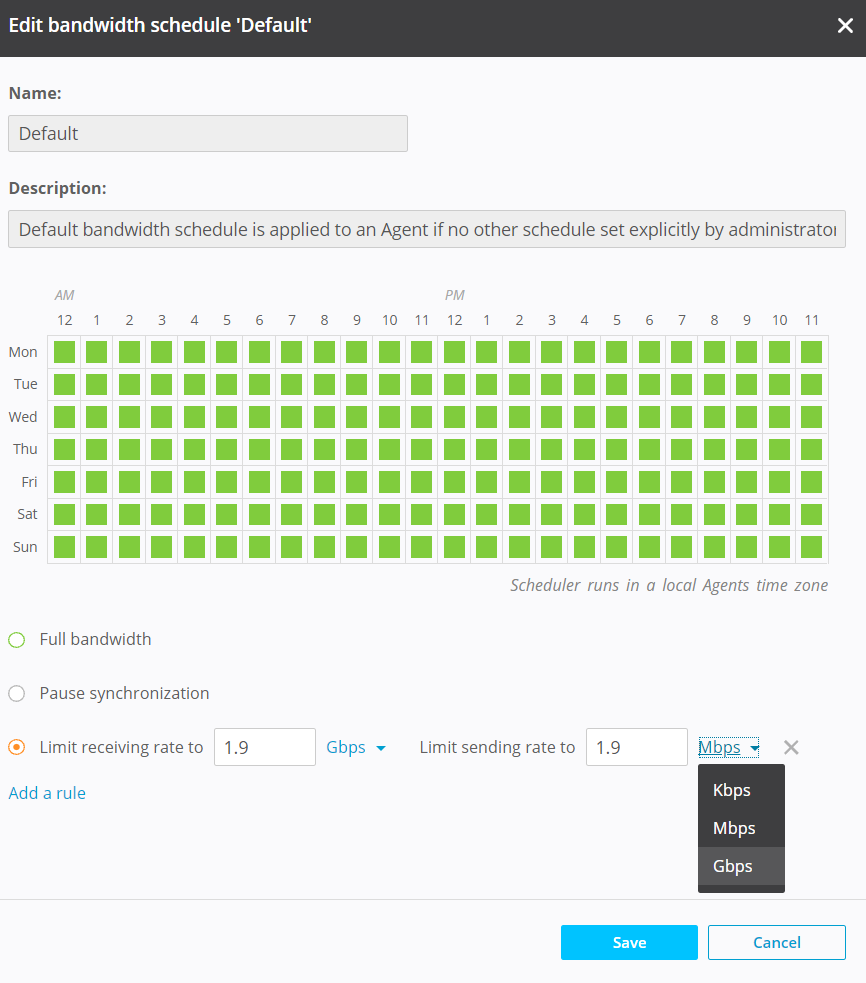
You can also use Resilio’s API to automate replication processes and script any type of functionality your job requires. Resilio provides flexible scripting triggers. Scripts may trigger actions before a job begins or after a job completes.
The documentary production company Delirio Films uses Resilio to sync large datasets across their remote, geographically distributed production teams. Because of Resilio’s flexible deployment and management capabilities, they can:
- Use their choice of media production tools and creative software — such as Adobe Premiere, DaVinci Resolve, and Avid Media Composer — as well as the file streaming solution LucidLink.
- Use their choice of storage systems, such as Facilis Terrablock and OWC ThunderBay.
- Manage and automate transfers and with Resilio’s Management Console and REST API — i.e., pausing and resuming jobs as needed, filtering subfolders, and modifying archive processes according to specific project requirements, etc.

State-of-the-Art Security Features
Rclone offers solid security features. You can use Rclone Crypt to encrypt and decrypt your files. And you can securely access and transfer files using SFTP (Secure File Transfer Protocol).
Resilio provides built-in security end-to-end. There’s no reliance on 3rd-party security services or VPNs. Some of the most important security capabilities include:
- Air gap-ready design for use on-prem or in a hybrid cloud.
- AES 256-bit encryption: Resilio encrypts data at rest and in transit.
- Mutual authentication: Before initiating a transfer, Resilio requires every endpoint to provide an authentication key — ensuring that your data is only delivered to secure, designated endpoints.
- Permission controls: You can control which users are able to access specific files and folders.
- Cryptographic data integrity validation: Resilio uses cryptographic validation to ensure files always arrive at their destination intact.
- Forward secrecy: Resilio uses one-time session encryption keys.
- Immutable copies: Resilio stores immutable copies of files in the cloud to protect you from ransomware.
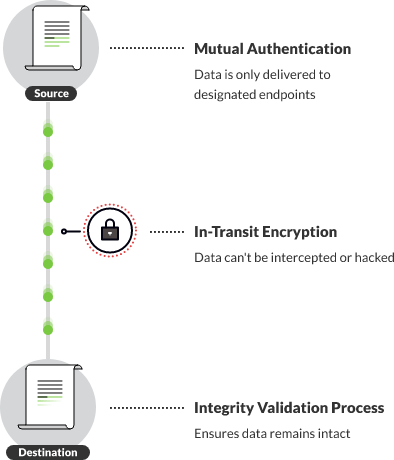
Please see the Resilio Security White Paper for more information on this topic.
Alternative File Sync and Transfer Solutions
In this section, we’ll share five other Rclone alternatives for syncing files across hybrid cloud environments. These solutions aren’t as robust, scalable, or versatile as Resilio and they don’t provide a file storage gateway. However, they can be a good choice for simpler transfer and sync use cases.
2. GoodSync
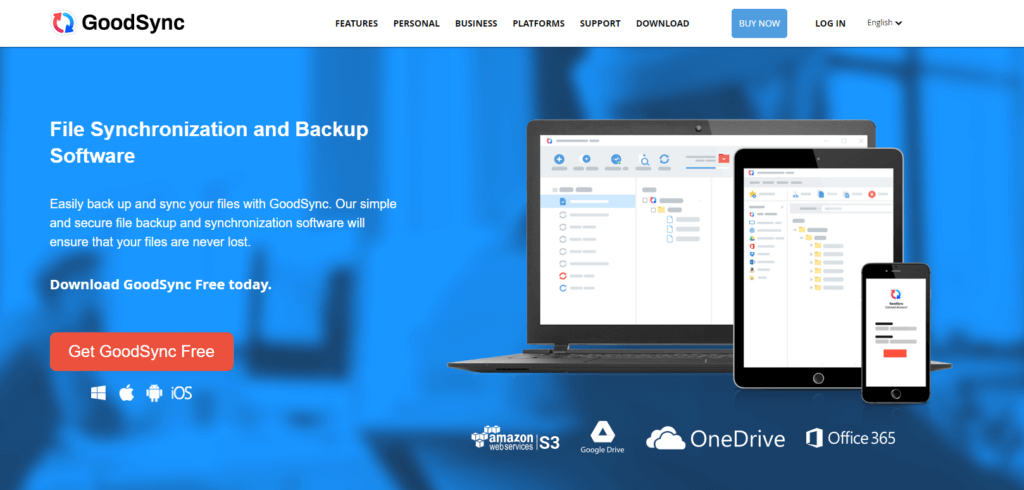
GoodSync is a file replication solution that supports Windows, Linux, NAS systems, and mobile devices. Like Rclone, it increases transfer speeds using multithreaded syncs and uses a hub-and-spoke replication architecture.
However, GoodSync offers other standout capabilities as well, such as bit-by-bit synchronization for data protection, AES-256 for encryption, and detailed logs of all file changes for analysis. They also offer a free and paid version of their SaaS solution, making them a cost-effective solution with competitive pricing.
Learn more: The 6 Best GoodSync Alternatives for Fast & Reliable File Sync
3. SureSync
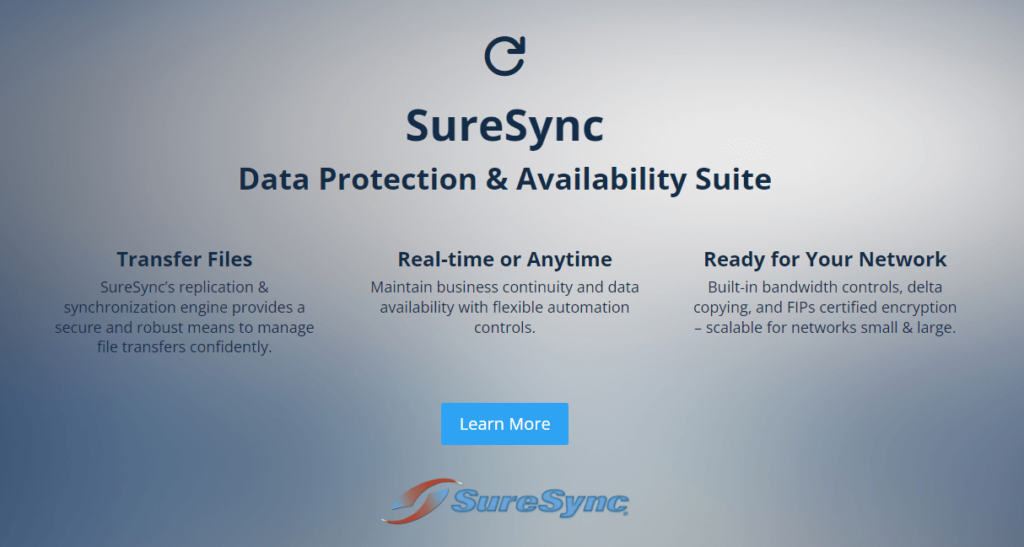
SureSync is a hybrid cloud synchronization solution that, like Resilio, can sync in real-time and only replicates file deltas using remote differential compression. It provides a centralized interface (the Enterprise Status Panel) you can use to create and manage replication jobs, configure automatic backups, control user permissions, and more.
Learn more: 4 SureSync Alternatives for Real-Time File Replication
4. Syncthing
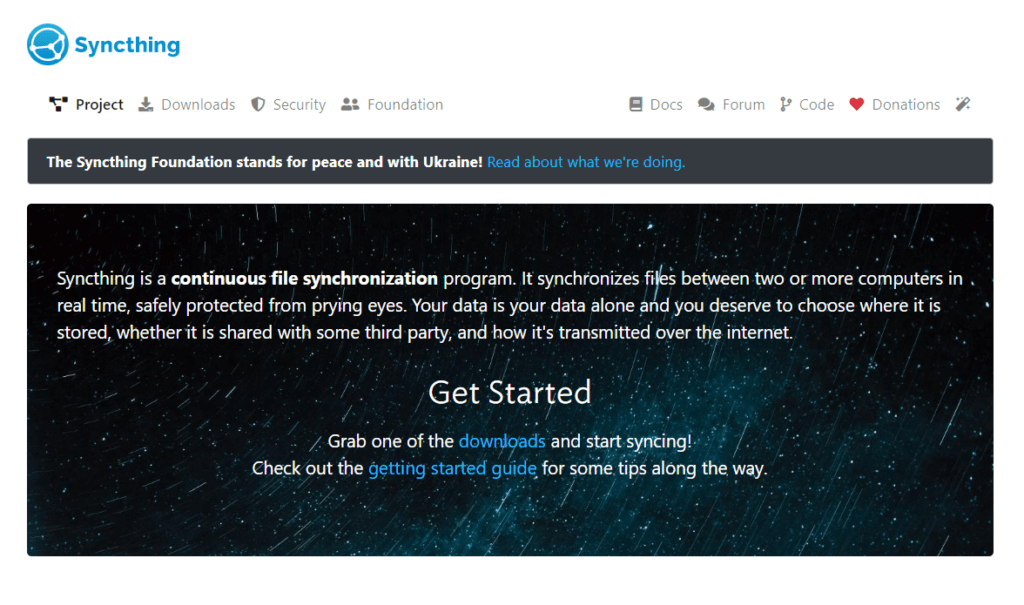
Like Rclone, Syncthing is an open-source file synchronization solution that you can use to sync hybrid cloud data. But, like Resilio, it uses a P2P replication architecture. So if you want a free solution that also offers the power of P2P sync, Syncthing may be your best option.
Syncthing is also a flexible and secure solution that:
- Supports multiple operating systems, such as Windows, Mac OS, Linux, OpenBSD, Solaris, FreeBSD, and more.
- Protects files using cryptographic certification and TLS encryption.
- Provides an open protocol and well-documented source code so you can deploy Syncthing as needed.
Learn more: 9 Syncthing Alternatives for Fast, Reliable Business File Sync
5. Rsync
Rsync is another open-source command-line software that was designed for Linux and Unix systems. Rsync is a reliable file replication solution for simple environments and workflows. However, it experiences errors when syncing a large number of files and doesn’t encrypt files (leaving them exposed, especially in transit).
Rsync also provides some positive features, such as end-to-end checks to ensure files reliably reach their destination and a remote update protocol that speeds file transfers.
Learn more: The Rsync Alternative — Resilio Active Everywhere
6. Azure File Sync
Azure File Sync is a file sync solution that only works with Microsoft’s cloud storage infrastructure, such as Azure Blobs, NetApps, etc. One of its key features is cloud tiering, which allows you to cache hot files (i.e., frequently accessed files) and store cool files in tiers based on volume-free space policies and date policies.
Like Rclone, Azure File Sync suffers from the limitations of hub-and-spoke replication. It also frequently experiences sync issues that you’ll have to troubleshoot.
Learn more: 8 Azure File Sync Alternatives & Complementary Solutions
Alternative Storage Gateway Solutions
In this section, we’ll share two file storage gateway solutions. Our list will focus only on gateway solutions that aren’t limited to a proprietary cloud (i.e., AWS Storage Gateway, Oracle Storage Gateway, etc.).
7. Stonefly
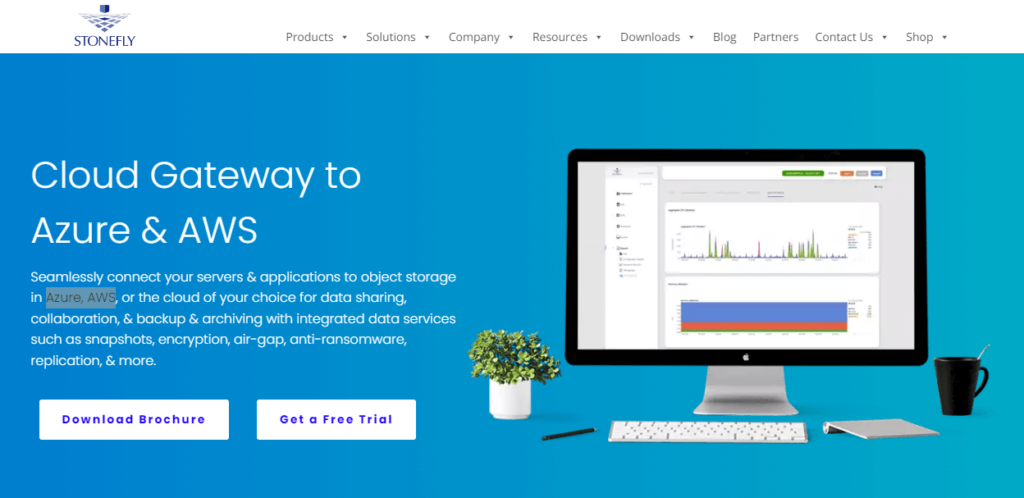
Stonefly is a multi-cloud storage gateway solution that works with just about any S3-compatible cloud storage provider, such as AWS S3, Azure Blobs, Google Cloud Platform, and more. It provides access via SMB and NFS protocols. And it supports many virtualization platforms, such as VMware, Microsoft Hyper-V, KVM, and Citrix.
Like Resilio, Stonefly enables you to manage your on-premises and cloud storage resources through a centralized interface.
8. Qnap Cloud Storage Gateway
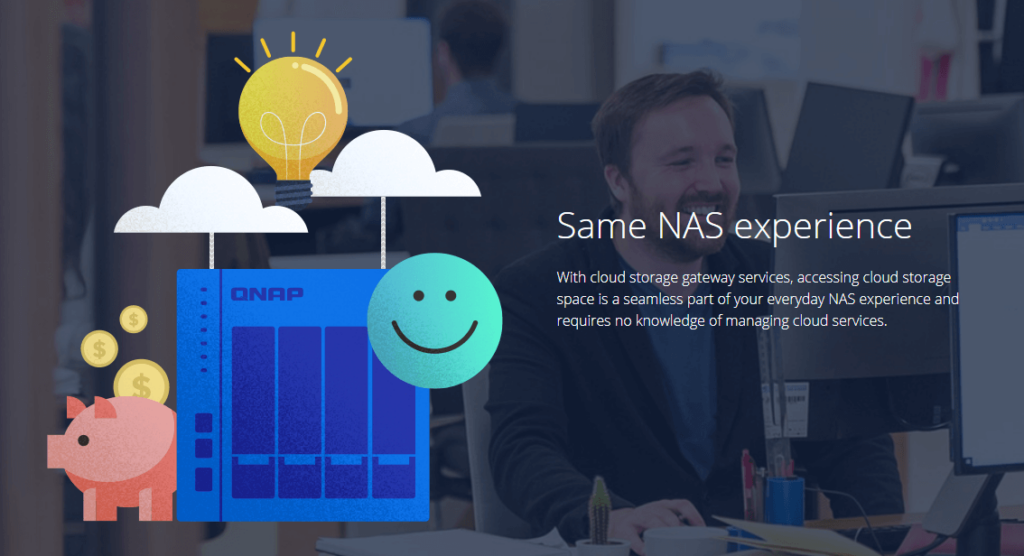
Qnap Cloud Storage Gateway allows organizations to integrate data stored on public and private clouds. And it supports just about any public or private cloud storage platform.
It provides access to cloud-based data using both file-based protocols (such as SMB, FTP, NFS, AFP) and block-based protocols (such as iSCSI). Like many solutions on this list, it caches frequently accessed files in local storage.
Use Resilio for Fast, Reliable & Secure File Access and Sync
Resilio is the best solution for fast-paced access and synchronization of large datasets across any network, distance, and storage type because it provides:
- Object storage gateway: Resilio offers a file gateway that provides end-users with low-latency access to data (stored in any file, block, or object storage) from any location.
- P2P synchronization: Resilio’s P2P sync architecture enables it to achieve blazing-fast sync speeds and eliminates single points of failure.
- Multidirectional sync: Resilio can sync files in any direction, such as one-way, two-way, one-to-many, many-to-one, and N-way. The ability to sync files to multiple endpoints concurrently makes Resilio an ideal solution for remote collaboration on large files across geographically distributed locations.
- WAN acceleration: Resilio’s proprietary WAN acceleration protocol enables it to fully utilize network bandwidth and provide fast, reliable transfers over any connection.
- Organic scalability: Resilio is designed to sync large datasets, regardless of file sizes or the number of files. And every endpoint you add to your environment only increases sync speed and available resources.
- Reliability: Resilio contains features that enhance sync reliability, such as dynamic rerouting, checksum restarts, and more.
- Vendor-agnostic integration: Resilio supports just about any storage device, operating system, and cloud services. You can easily deploy it on your current IT infrastructure and integrate it with the tools your team is already using.
- Easy management: Resilio provides complete control over your entire replication environment from one centralized location. You can also use Resilio’s REST API to script any type of functionality your jobs require.
- Bulletproof security: Resilio contains security features that protect your data at rest and in transit.
To learn more about how Resilio can help you quickly transfer, sync, and access files of any size across any number of endpoints, schedule a demo with our team.





